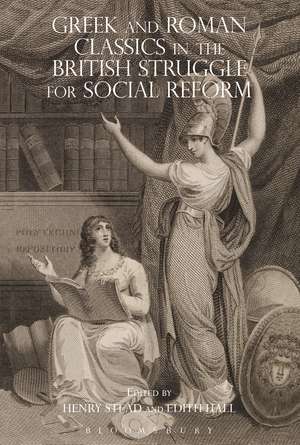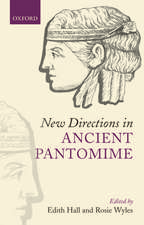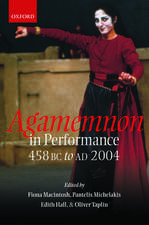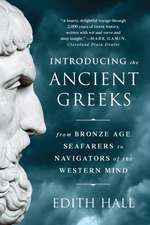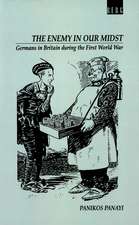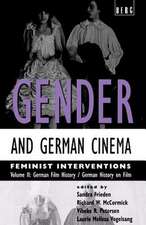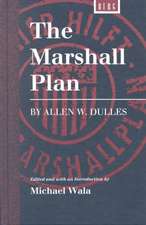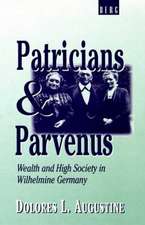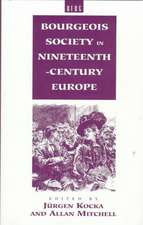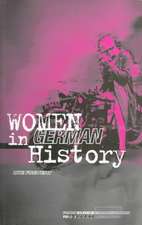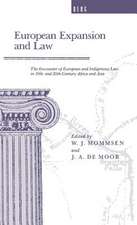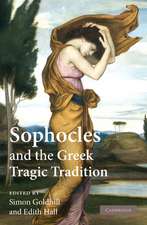Greek and Roman Classics in the British Struggle for Social Reform: Bloomsbury Studies in Classical Reception
Editat de Dr Henry Stead, Edith Hallen Limba Engleză Paperback – 14 dec 2016
| Toate formatele și edițiile | Preț | Express |
|---|---|---|
| Paperback (1) | 261.08 lei 6-8 săpt. | |
| Bloomsbury Publishing – 14 dec 2016 | 261.08 lei 6-8 săpt. | |
| Hardback (1) | 952.68 lei 6-8 săpt. | |
| Bloomsbury Publishing – 17 iun 2015 | 952.68 lei 6-8 săpt. |
Din seria Bloomsbury Studies in Classical Reception
-
 Preț: 90.70 lei
Preț: 90.70 lei - 14%
 Preț: 180.44 lei
Preț: 180.44 lei - 30%
 Preț: 598.52 lei
Preț: 598.52 lei - 11%
 Preț: 218.91 lei
Preț: 218.91 lei -
 Preț: 90.37 lei
Preț: 90.37 lei - 22%
 Preț: 225.77 lei
Preț: 225.77 lei - 11%
 Preț: 220.75 lei
Preț: 220.75 lei - 30%
 Preț: 540.31 lei
Preț: 540.31 lei - 22%
 Preț: 224.94 lei
Preț: 224.94 lei - 22%
 Preț: 237.75 lei
Preț: 237.75 lei - 30%
 Preț: 597.63 lei
Preț: 597.63 lei - 22%
 Preț: 224.03 lei
Preț: 224.03 lei - 21%
 Preț: 218.74 lei
Preț: 218.74 lei - 21%
 Preț: 218.65 lei
Preț: 218.65 lei - 22%
 Preț: 225.96 lei
Preț: 225.96 lei - 21%
 Preț: 218.47 lei
Preț: 218.47 lei - 30%
 Preț: 569.76 lei
Preț: 569.76 lei - 21%
 Preț: 217.62 lei
Preț: 217.62 lei - 23%
 Preț: 185.19 lei
Preț: 185.19 lei - 20%
 Preț: 219.57 lei
Preț: 219.57 lei - 30%
 Preț: 541.85 lei
Preț: 541.85 lei - 18%
 Preț: 166.36 lei
Preț: 166.36 lei - 30%
 Preț: 569.60 lei
Preț: 569.60 lei - 23%
 Preț: 254.55 lei
Preț: 254.55 lei - 30%
 Preț: 599.41 lei
Preț: 599.41 lei - 22%
 Preț: 260.16 lei
Preț: 260.16 lei - 30%
 Preț: 598.02 lei
Preț: 598.02 lei - 30%
 Preț: 569.70 lei
Preț: 569.70 lei - 21%
 Preț: 218.65 lei
Preț: 218.65 lei - 30%
 Preț: 568.22 lei
Preț: 568.22 lei - 22%
 Preț: 772.98 lei
Preț: 772.98 lei
Preț: 261.08 lei
Preț vechi: 333.06 lei
-22% Nou
Puncte Express: 392
Preț estimativ în valută:
49.96€ • 51.97$ • 41.25£
49.96€ • 51.97$ • 41.25£
Carte tipărită la comandă
Livrare economică 15-29 aprilie
Preluare comenzi: 021 569.72.76
Specificații
ISBN-13: 9781350019164
ISBN-10: 135001916X
Pagini: 384
Dimensiuni: 156 x 234 x 31 mm
Greutate: 0.54 kg
Ediția:NIPPOD
Editura: Bloomsbury Publishing
Colecția Bloomsbury Academic
Seria Bloomsbury Studies in Classical Reception
Locul publicării:London, United Kingdom
ISBN-10: 135001916X
Pagini: 384
Dimensiuni: 156 x 234 x 31 mm
Greutate: 0.54 kg
Ediția:NIPPOD
Editura: Bloomsbury Publishing
Colecția Bloomsbury Academic
Seria Bloomsbury Studies in Classical Reception
Locul publicării:London, United Kingdom
Caracteristici
Excavates previously neglected materials and personalities from inaccessible archival sources, and presents them in a lively and inspirational manner
Notă biografică
Edith Hall is Professor of Classics, King's College London, UK, and Consultant Director of the APGRD in Oxford, UK. She has published more than twenty books on ancient Greek culture and its reception including Inventing the Barbarian (1989), The Theatrical Cast of Athens (2006), The Return of Ulysses (2008), Greek Tragedy (2010), Adventures with Iphigenia in Tauris (2013) and Introducing the Ancient Greeks (2014).Henry Stead is AHRC Postdoctoral Research Associate, King's College London, UK, and author of A Cockney Catullus (forthcoming).
Cuprins
1. Introduction, Henry Stead (King's College London, UK) and Edith Hall (King's College London, UK)2. Radicalism and Gradualism Enmeshed: Classics from the Grass-roots in the Cultural Politics of 19th-century Britain, Lorna Hardwick (Open University, UK) 3. Coleridge's Classicised Politics, Adam Roberts (Royal Holloway London, UK)4. Swinish Classics; or, a Conservative Clash with Cockney Culture, Henry Stead (King's College London, UK)5. The Harmless Impudence of a Revolutionary: Radical Classics in 1850s London, Edmund Richardson (University of Leeds, UK)6. Making it Really New: Dickens versus the Classics, Edith Hall (King's College London, UK)7. Classics and Social Closure, Christopher Stray (University of Swansea, UK)8. Hercules as Symbol of Labour: a 19th-century Class-conflicted Hero, Paula James (Open University, UK)9. Vulcan - A 'Working Class' God? Annie Ravenhill-Johnson (University of Aberystwyth, UK) 10. Nature versus Nurture: Population Decline and Lessons from the Ancient World, Sarah J. Butler (Royal Holloway London, UK)11. The Space of Politics: Classics, Utopia and the Defence of Order, Richard Alston (Royal Holloway London, UK)12. Classically Educated Women in the Early Independent Labour Party, Edith Hall (King's College London, UK)13. The Greeks of the W.E.A.: Realities and Rhetorics in the First Two Decades, Barbara Goff (University of Reading, UK)14. Christopher Caudwell's Greek and Latin Classics, Edith Hall (King's College London, UK)15. Staging the Haitian Revolution in London: Britain, the West Indies and C.L.R. James' Toussaint Louverture, Justine McConnell (University of Oxford, UK)16. Yesterday's Men: Labour's Modernising Elite from the 1960s to Classical Times, Michael Simpson (Goldsmith's College London, UK)BibliographyIndex
Recenzii
This collection explores some unfamiliar byways and usefully reacts against ... the idea that classical culture was used as a barrier to keep the workers out.
The first substantial published product of the pioneering Arts and Humanities Research Council 'Classics and Class in Britain 1789-1939' project ... [features] a sparky introduction ... [and] is full of unexpected gems ... A pioneering project, and one full of potential for expansion and elaboration in terms both of subjects and of individuals.
The aims of the volume are to be commended, and a book such as this provides a means for the reader to add some all-important (modern) historical context to his or her study of the ancient world.
It is an important achievement of Stead and Hall's volume that it succeeds in showcasing a wide range of contexts in the history of British social and political reform where the Greek and Roman classics have played a role in shaping, inspiring and legitimising a progressive and reformist agenda ... To render this elusive, complex dialogue more visible and graspable for the reader is the real achievement of [their] volume.
A bold and theoretically sophisticated look at the relationship between Greek and Roman classics as cultural property and social class in Britain. This volume demonstrates that while it is the case that access to classical education maintained barriers it is also irrefutably true that reform-minded people from all classes appropriated the classics in compelling ways, and that a diversity of engagements with the classical world characterizes this unruly period in British history. Anyone interested in the future of classics should read this account of its past.
The first substantial published product of the pioneering Arts and Humanities Research Council 'Classics and Class in Britain 1789-1939' project ... [features] a sparky introduction ... [and] is full of unexpected gems ... A pioneering project, and one full of potential for expansion and elaboration in terms both of subjects and of individuals.
The aims of the volume are to be commended, and a book such as this provides a means for the reader to add some all-important (modern) historical context to his or her study of the ancient world.
It is an important achievement of Stead and Hall's volume that it succeeds in showcasing a wide range of contexts in the history of British social and political reform where the Greek and Roman classics have played a role in shaping, inspiring and legitimising a progressive and reformist agenda ... To render this elusive, complex dialogue more visible and graspable for the reader is the real achievement of [their] volume.
A bold and theoretically sophisticated look at the relationship between Greek and Roman classics as cultural property and social class in Britain. This volume demonstrates that while it is the case that access to classical education maintained barriers it is also irrefutably true that reform-minded people from all classes appropriated the classics in compelling ways, and that a diversity of engagements with the classical world characterizes this unruly period in British history. Anyone interested in the future of classics should read this account of its past.
